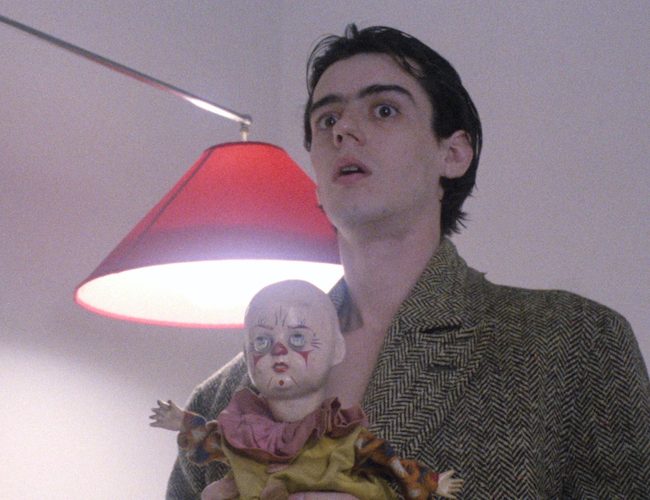FUNNY FACE INTERROGATES THE REVENGE GENRE

(Tim Sutton’s 5th film Funny Face is available now via Gravitas Ventures. Like what you see here on Hammer to Nail? Why not give just $1.00 per month via Patreon to help keep us going?)
Tim Sutton’s first film, Pavilion was an exciting discovery for many of us at SXSW 2012. A lyrical film that explored early teenage life by contrasting experiences in two different landscapes, the film was also an inquiry into the nature of film narrative. It asked if a story needed a hero, scripted dialogue, and plot causality: could a film narrative that didn’t have those literary elements still deliver joy? What would it feel like to experience characters, landscape, and silence outside of the structure that delivers transformation or redemption? Pavilion was one of those rare American films that was willing to ask those big formal questions. It was a challenge that not every viewer was up for, but many found transcendence in its sun-blasted images, and to this day the film remains a major trail marker for many young filmmakers.
Funny Face is Tim Sutton’s new film, and his third in a series of ruminations on white male anger. Donnybrook (2018) was a brutal exploration of male self abuse through the setting of bare knuckle fighting. It was also an exploration into the foundations of family. Dark Night (2016) looked at alienation and the isolation brought on through digital socialization. It also touched on the intersection of popular myth and the way in which this alienation is processed through the typical violent Hollywood narrative. The film sets its thematic locus around the Aurora Colorado Dark Knight Rises theater shooting.
In Funny Face, when we first meet Saul (Cosmo Jarvis) he is wearing his pants high on his waist. He is mocked for having no friends – in this way, he is the classic bullied loner we have seen countless times, most recently in Todd Phipps Joker. Saul has by chance met Zama (Dela Maeskienyar) an alienated outsider who has run away from over bearing parents. Zama wears her niqab somewhat begrudgingly but also as a sort of protective shield. These two make for a clumsy couple and their relationship unfolds in small awkward beats. Like Travis Bickle, Saul is not too suave with the ladies: the morning after their first night together, “breakfast” is served from a sack as they stand in the gutter. But at least he’s nice enough to ask her if she wants a bite. This is one of the many meals they will share together as they accompany each other through a journey across a changing and at times inhospitable Brooklyn.
Saul’s anger derives from the fact that he and his family are about to be evicted by greedy developers. He also has a gripe against the local sports team, which I didn‘t understand but it doesn’ t matter – Funny Face is not about the evils of gentrification or the fact that Tom Brady was traded off of the Giants. The point is how this particular character reacts to injustice.
Funny Face seeks to find an intersection between actual male alienation and Hollywood myths through an invocation of the genre tropes of the mask wearing loner challenging the unforgiving dirty city and its greedy evil doers.
At times it’s as if we took one of the confused and inarticulate kids from Pavillion and dropped him inside Joker or any other Hollywood genre tale that pits the alienated hero against injustice. Early on it was at times jarring because the result feels like a battle between two different movies. We have the lyrical wide screen shots of the lone figure in the barren landscape and then the tightly framed Giuliani type bad guys, eyes ablaze with lust and greed, as they enact their plan for the rise of the evil empire. It’s only at the film’s second act when Saul attempts to have a normal relationship with Zama, where I started to understand the film’s principal dramatic question: how does the typical Hollywood narrative tell us this story will end? How will Saul get revenge against those who are destroying Gotham?

Saul starts to plot revenge while hiding behind a mask of anonymity (the mask, though it invokes Joker and V for Vendetta, is actually an old Coney Island icon). We know where this is headed. We live this narrative every day: just this month there were at least 20 mass shootings. Most of them perpetrated by men similar to Saul: men who had gripes, many of them spending time yelling behind the mask of social media. The story inside Funny Face plays out across these very real headlines as well as our own understanding of the lone angry man in American genre films. Funny Face asks questions about both the nature of revenge and the way anonymous masks can enable men to act out violently. These are the questions that are presented to us through the journey of this classic American anti-hero.
So, how do we want this particular story to end? Does every second act disagreement or grievance have to escalate into a third act blood bath? Why are we so often locked into this narrative pattern? Are there not other ways for us to deal with this anger? Tim Sutton is not asking if violent films provoke unstable men to act violently; he’s asking if there is an alternative to that typical bloody third act. Can we question the validity of revenge in our narratives without that violent climax? That typical genre narrative arc is what is being interrogated here. In this way, Funny Face is as much about alienation as it is about the stories we tell each other about how this alienation should be transformative.
Saul’s journey, as it plays out in the film will be a challenge for many festival programmers , distributors, streamers and reviewers (the film had it’s festival premiere in Berlin). For those who judge films according to whether or not the characters are relatable or fun, or how the story works in relation to other stories they liked, Funny Face will be frustrating. The film will also not be palatable to those who want neatly tied Stanley Kramer like message bundles (i.e., most American festival programmers). But for those who enjoy lyrical auteurs interrogating genres (not too many Americans other than Hartley and Altman) and for those who find that most current American festival indies are “after-school special” tedious, then this is for you. If you also have spent any time thinking about why Trump liked joker or if you ever wondered if Travis Bickle today would be a Proud Boy, you should see Funny Face and weave that into thoughts on the evolving history of the angry male American film loner.
Funny Face may be a transitional film in Tim Sutton’s rapidly expanding body of work (five art films in ten years is pretty good for these times), and I for one can’t wait to see how he continues to evolve. I hear his next film is a western.
— Mike S. Ryan











